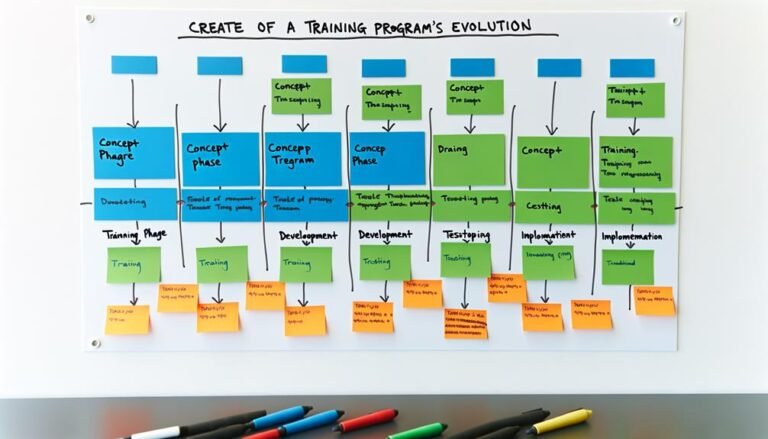Ebbinghaus' Curve: Master Memory Retention Techniques Now
In the realm of cognitive psychology, understanding the intricacies of memory retention is paramount to enhancing learning outcomes.
Ebbinghaus's curve, a cornerstone in memory research, offers profound insights into optimizing memory retention techniques. By unraveling the mysteries of how we learn and forget information, Ebbinghaus paved the way for a deeper comprehension of effective learning strategies.
As we explore the implications of his findings, a world of possibilities emerges in harnessing our memory's full potential. Discover how mastering Ebbinghaus's curve can revolutionize your approach to memory retention techniques and elevate your learning endeavors to new heights.
Key Takeaways
- Rapid knowledge acquisition post-initial struggles.
- Combat memory loss with reinforcement within 30 days.
- Optimal retention through spaced learning over time.
- Position important content at the start and end for better recall.
Memory Retention Techniques Overview
In the realm of cognitive science and educational psychology, understanding memory retention techniques is paramount for optimizing learning outcomes and enhancing knowledge retention. Utilizing memory retention tips and cognitive enhancement techniques can significantly impact one's ability to retain and recall information efficiently.
Strategies such as spaced learning over time, reinforcing training within the crucial 30-day window post-learning, and strategically placing key information at the beginning and end of courses/modules can enhance memory retention. Additionally, incorporating microlearning sessions that offer spaced bursts of learning can aid in better mastery of content.
Ebbinghaus' Learning Curve Insights
Unveiling the foundational principles of Ebbinghaus' learning curve provides crucial insights into the dynamics of memory acquisition and retention. Ebbinghaus's findings emphasize cognitive enhancement through learning optimization.
Understanding the learning curve aids in developing strategies for enhanced memory retention. By recognizing the importance of spaced learning and the primacy/recency effect, individuals can optimize their learning processes.
Ebbinghaus's research underscores the significance of reinforcing training within 30 days to combat memory loss effectively. Leveraging these insights can lead to improved long-term memory and overall cognitive abilities.
Applying Ebbinghaus's principles to educational practices facilitates the creation of tailored learning experiences and supports cognitive enhancement strategies for personal growth and professional development.
Meacham's Impact on Learning
Margie Meacham's impactful contributions to the field of learning have revolutionized the integration of neuroscience theories with practical applications, enhancing various learning experiences for individuals and organizations alike.
- Meacham's pioneering use of video conferencing and e-learning has transformed training methodologies.
- She merges neuroscience theories with practical applications to facilitate the formation of new neural connections through learning.
- Meacham's impact extends to enhancing leadership skills, improving teaching methods, aiding in parenting, and boosting employee performance.
- Practical learning strategies developed by Meacham emphasize leveraging brain functions for optimal learning outcomes.
- Her work underscores the importance of understanding neuroscience applications in designing effective learning programs tailored to individual and organizational needs.
Brain Functions and Memory Retention
Understanding the intricate relationship between brain functions and memory retention is fundamental to optimizing learning outcomes and cognitive performance. The brain's remarkable plasticity allows for constant adaptation and learning, paving the way for cognitive enhancement. Research indicates that leveraging brain plasticity through tailored educational strategies can significantly improve memory retention and overall cognitive abilities. To illustrate this further, consider the following table:
| Brain Functions | Memory Retention |
|---|---|
| Brain plasticity allows for adaptation and learning | Tailored strategies enhance memory retention |
| Cognitive enhancement through optimized learning outcomes | Improved cognitive abilities and performance |
| Utilizing neuroscience insights for effective learning experiences | Unlocking human potential for growth and accomplishment |
Effective Training Strategies
The optimization of memory retention and cognitive performance through effective training strategies is a critical component in maximizing learning outcomes and enhancing overall performance.
To achieve this, consider the following key strategies:
- Training reinforcement: Regular reinforcement within the first 30 days is crucial to combat memory loss.
- Learning mastery: Spacing learning over time leads to better retention and long-term memory.
- Strategic content placement: Positioning important points at the beginning and end of courses/modules aids in learning the content in the middle.
- Microlearning: Utilize spaced bursts of learning to enhance mastery.
- Supportive strategies development: Develop tailored strategies to support different learning styles and preferences effectively.
Legacy of Ebbinghaus' Discoveries
Ebbinghaus's seminal discoveries in memory retention techniques continue to shape and influence contemporary understanding of learning processes. Ebbinghaus' influence resonates through the concept of the learning curve, which highlights rapid knowledge acquisition following initial struggles, and the forgetting curve, illustrating memory recall patterns.
Moreover, his work on the spacing effect and primacy/recency effect remains fundamental in educational psychology. Despite not always receiving full credit, Ebbinghaus's legacy endures in modern studies on memory and cognition.
Meacham's contributions further enrich this legacy by merging neuroscience theories with practical applications, enhancing learning experiences across diverse domains. Her innovative approach, including the use of video conferencing and e-learning, has significantly impacted effective learning strategies, underscoring the ongoing relevance of Ebbinghaus' pioneering work.
Future of Learning and Neuroscience
Building on Ebbinghaus's foundational research and Meacham's innovative applications, the evolving landscape of learning and neuroscience promises groundbreaking advancements in cognitive enhancement strategies and educational methodologies. The future of learning and neuroscience holds exciting possibilities, driven by advancements in technology and a deeper understanding of cognitive enhancement.
Key areas of focus include:
- Integration of virtual reality and AI in educational settings.
- Harnessing neuroplasticity for personalized learning experiences.
- Utilizing brain-machine interfaces for enhanced cognitive abilities.
- Developing adaptive learning systems based on real-time brain data.
- Exploring the potential of neurofeedback for optimizing learning outcomes.
Conclusion
In conclusion, mastering memory retention techniques is akin to sharpening a blade for optimal performance. By understanding the principles elucidated by Ebbinghaus, individuals can enhance their learning endeavors and bolster their cognitive abilities.
The legacy of Ebbinghaus's discoveries continues to shape educational practices and pave the way for future advancements in the field of neuroscience. Embracing these insights will empower individuals to navigate the complexities of memory retention with precision and efficacy.






